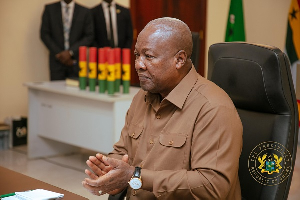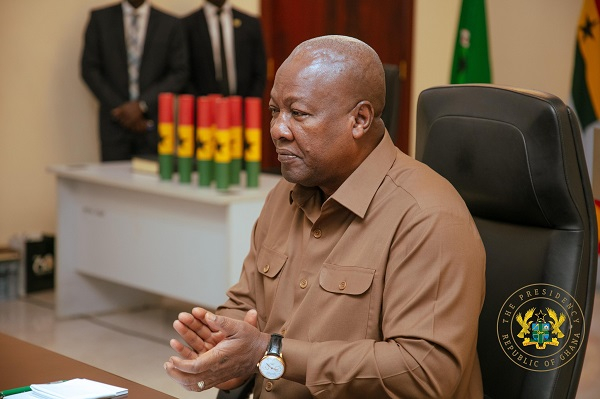 President John Dramani Mahama
President John Dramani Mahama
Ninety days into President John Dramani Mahama’s administration, a palpable sense of optimism permeates Ghana.
Following through on campaign promises and enacting bold reforms, the initial phase of his leadership has resonated with the Ghanaian populace, as reflected in a recent Global Info Analytics poll revealing a strong 66% approval rating.
Mahama’s commitment to collaborative governance was immediately evident with the National Economic Dialogue. The recommendations stemming from this crucial forum are already being implemented, suggesting a genuine effort to incorporate diverse perspectives in shaping economic policy.
Similarly, the swift constitution of a Constitutional Review Committee, actively engaging with stakeholders, signifies a dedication to strengthening Ghana’s democratic foundations.
One of the most significant early changes has been a drastic reduction in the number of ministers, slashed from a bloated 126 to a more streamlined 60. This move signals a commitment to efficiency and cost-effectiveness in government.
Coupled with the appointment of the youngest cohort of CEOs and Ministers in Ghana’s history, it injects fresh perspectives and dynamism into leadership.
Beyond domestic policy, President Mahama has prioritised strengthened collaboration, coordination, and consultation with neighbouring countries. This proactive approach aims to foster regional stability and mutually beneficial partnerships.
Crucially, the new administration has acted decisively to alleviate economic burdens on citizens. The E-Levy, Betting Tax, and Emissions Levy – all unpopular measures from the previous administration – have been scrapped, fulfilling a key campaign promise.
Furthermore, the establishment of GoldBod, a crucial initiative for managing Ghana’s gold resources, has been implemented as pledged.
Significant investments in youth development and entrepreneurship underscore the government’s focus on long-term prosperity. GH¢300 million has been allocated for the apprenticeship programme, offering invaluable skills and opportunities for young Ghanaians.
Similarly, the GH¢100 million edwumawura project and the GH¢50 million Women Dev’t Bank demonstrate a clear commitment to job creation and economic empowerment for all.
Further demonstrating fiscal responsibility, GETFund and Road Fund have been decapped, freeing up resources for critical infrastructure development and education. The clearance of nursing training allowance arrears has restored faith in the government’s commitment to supporting essential healthcare workers.
Equally welcome is the resumption of NHIS payments, ensuring access to healthcare for all Ghanaians.
Beyond these tangible economic and social improvements, the first 90 days have also seen a renewed focus on combating crime and corruption. A significant breakthrough – the first seizure of illicit drugs in eight years – highlights the renewed effectiveness of security services under the new administration.
Perhaps most remarkably, the Tema Oil Refinery (TOR) is experiencing a resurgence, now operating profitably. This turnaround, after years of struggles, speaks volumes about the effectiveness of the new management and government support.
Coupled with this positive economic sign, the Treasury Bill rate is showing a downward trend for the first time in eight years, offering further hope for economic stability.
In conclusion, President Mahama’s first 90 days have been characterised by decisive action, fulfilled promises, and a clear vision for Ghana’s future. From economic reforms and social investments to strengthened regional ties and a renewed focus on law and order, the administration has laid a solid foundation for progress.
The overwhelmingly positive response from the public, reflected in the high approval rating, suggests a renewed sense of hope and confidence in Ghana’s trajectory under President Mahama’s leadership. The journey is just beginning, but the initial signs are promising, suggesting a brighter future for the nation.


